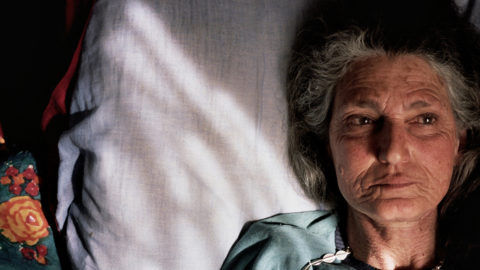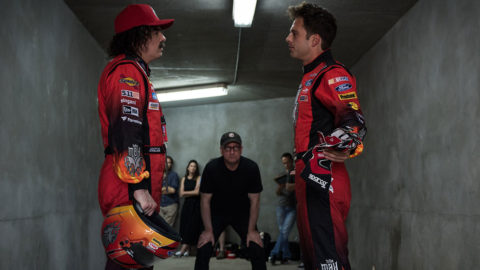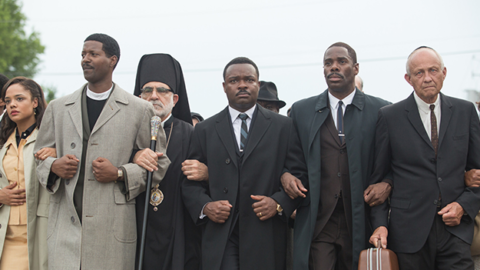Interview: André Holland
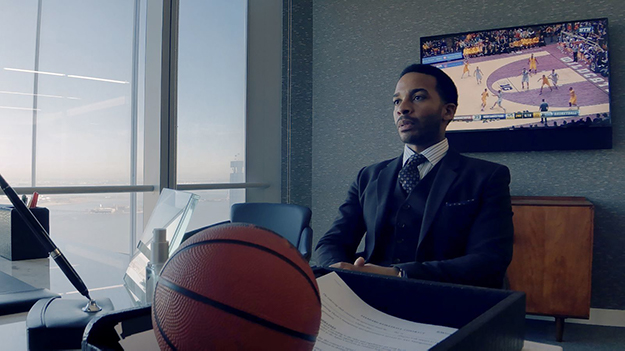
“The key is contained in the question of where the power lies,” James Baldwin wrote in The Devil Finds Work, a question at the heart of Steven Soderbergh’s High Flying Bird. The film chronicles 72 hours in the life of sports agent Ray Burke (André Holland) who, in the midst of an NBA lockout, sees a window of opportunity to disrupt the game of basketball and help put agency back into the hands of players like his client, Erick (Melvin Gregg) and his rival Jamero Umber (Justin Hurtt-Dunkley). With his assistant Sam (Zazie Beetz) at his side and the council of Myra (Sonja Sohn), Burke seeks to mastermind a way to both end the lockout and subvert the ways in which the NBA operates at large.
“They built a game on top of the game,” is a common refrain in the film. That’s where the power lies, in the hands of the team owners like David Seton (Kyle MacLachlan) who fly in private jets and conduct business in glass towers with very little regard for those they capitalize on. The players are left vulnerable the minute that the terms, which usually include more money and power for owners, aren’t met. As Ray takes a step back to size up the power structure, he realizes that the key is in the newfound autonomy the players have during the lockout. From there, they begin gaming a system predicated on very rich white men exploiting black athletes with impunity.
The roles André Holland chooses to embody feel carefully curated. He has crafted a career out of playing black disruptors and innovators, most notably on The Knick (also directed by Steven Soderbergh) as black surgeon Algernon Edwards, a doctor trying to get ahead despite racist forces unwilling to acknowledge his brilliance. Prior to his turn as Ray Burke, Holland also played death row lawyer Henry Deaver (and seemingly the only black man in Maine) on Castle Rock, a show based on the work of Stephen King. There’s a seriousness about his craft that shines through in his film and television work: in many cases he’s David staring down Goliath, keeping his head in the face of systems designed to prevent him from succeeding.
High Flying Bird was written by Tarell Alvin McCraney, with whom Holland has worked with extensively in the theater; Moonlight, which also featured Holland, was adapted from McCraney’s play. McCraney’s screenplay anchors the film, which is dialogue heavy, but never heavy handed. The language is lyrical, and the repetition of, “I love the Lord and all his black people” every time a parallel is drawn between basketball and slavery underlines the theme with a sly comedic bent, as opposed to beating us over the head with it.
Steven Soderbergh rounds out the meeting of the minds behind High Flying Bird. When I heard it had been shot on an iPhone, I had my doubts, especially, considering the fraught relationship between black people and the camera. However, after seeing the film, any doubts I had were laid to rest. This isn’t Soderbergh’s first time exploring the themes of exploitation, capitalism, and labor (Magic Mike, Erin Brockovich, etc.), but with the help of André and Tarell, the film deals with race and class exploitation in ways that make its themes applicable far beyond the world of the NBA, a commentary on the ways in which most industries deal with black talent. A few nights before the February 8 release of High Flying Bird on Netflix, Holland and I discussed the ideas that lead to the film’s inception, owning one’s self-image as a black actor, and his new foray into producing.
So you conceptualized the film and brought it to Soderbergh? Tell me about the process.
Well, we came up with it together. It happened back when we were working on The Knick five years ago. I was feeling a little bit frustrated in terms of the lack of scripts out there, and so I started pitching him some ideas that I had. He was really generous and open and allowed me to throw some crazy ideas at him. [Laughs] And then we started exchanging books. I gave him my favorite Baldwin book of essays and…
Which Baldwin?
Price of the Ticket. I went and found a copy on eBay, I think it was… and I went to give it to Steven as a birthday gift. He got really into it and then he gave me a Ralph Wiley book and we kept going back and forth. Through those conversations around those books and around the ideas I was pitching, we came up with this idea. Then we worked on it a little together and then he said, well, we need a writer. So I called up Tarell and brought him into the conversation, and they got along really well. We kept working, and then Moonlight happened, so things kind of slowed down because Tarell got really busy obviously with Moonlight. And then we kept working on it and here we are.
Prior to Tarell coming on, did you have any interest in maybe writing it yourself?
No, not really. I have a producing partner, Maurice Anderson. We started our company, Harper Road Films. I’m very proud of the name. He and I at one point toyed with writing it ourselves, partly because we’re both really impatient. “It’s going to take us a couple of years if we got a writer—let’s just do it!” But I’m not a writer and neither is he, so we did right by waiting on Tarell.
I heard the film was shot in 13 days! What was the process like shooting a film that quickly and on an iPhone, right?
Yeah! On an iPhone. It was fun, it was… Steven works really fast, really efficiently. When we did The Knick, I think we did something like 10 episodes in 73 days. It was crazy fast. On this one, people say its an iPhone, and it is, but he has other lenses and things that he’s using as well. It’s not just like you throw your iPhone on and make it. He knows what he’s doing. It allowed us to move really fast. We would do a scene like that first scene, which was like a 10-page dialogue scene that would’ve taken ages to do traditionally. In our case he could set a phone on a table and set another one up here and put one on the floor. We could get it pretty quickly and then move on to the next thing. At first when I saw the setup, I was like, really, that’s it? You sure? You know what I mean? But once I looked at the images… Oh man, it actually looks good! And it’s fun.
As an actor how does it feel? Does it change the way you approach anything? Mannerisms?
At the beginning I felt maybe I had to be a little bit bigger. The camera is so small and it’s way over there—do I have to add a little something on it? And then once I saw it, I could calibrate the performance from there. It also allowed us to keep an energy—because this script is so hyperverbal and my character does not stop talking pretty much for 80 pages. That’s one of the challenges when you’re shooting a scene like that, in a traditional way, and the first scene is 10 pages of dialogue. We’ll put the camera over here and do your side of it, then we’ll take two and a half hours to turn around to get my side of it and then you’ve got to rev yourself back up. In this case, it’s like all right, let’s do it! Do it, do a couple takes, move the iPhone, do it again! Cool, we got it! Let’s move on! So you keep that energy up. So yeah, I like that.
Your character for me felt very paternal. What kind of research of approach did you take to portray Ray Burke?
I’m so glad you caught that. There’s a backstory that’s alluded to in the script of Ray having lost his cousin, someone he’s very close to called Gavin, and so I have a whole backstory about that in my mind. And I think that because of that loss, he does treat Erick and all of his clients in a very paternal kind of way. He’s very close to them and he wants to take good care of them, but I think also because of that trauma he kind of keeps them at a distance or tries to keep them at a distance. He tries to pretend he’s not as invested as he clearly is. And I really like that part of him, and I think that’s something that I also tend to do in my life. I tend to get really invested, really quickly. I like that part of him.
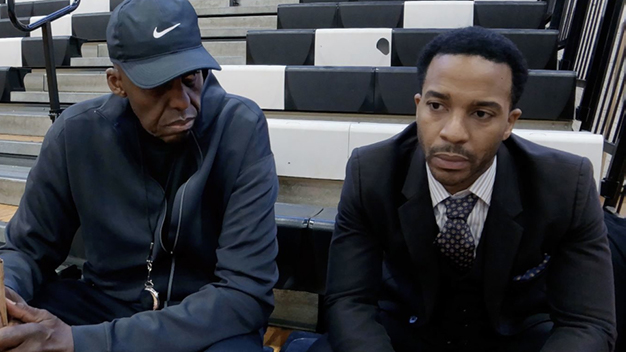
Is this your first time producing a film?
Mmm.
What was that like? How are you feeling?
It was amazing! That’s the best part of this whole thing. The acting is cool too, don’t get me wrong. But I remember looking at a blank page—there’s nothing on it. Knowing that we get to take an idea—and by “we” I mean like me and my producing partner and Tarell, all of us—and take it from that stage to this stage is so exciting. And now I feel like all these other ideas I have, these other projects I’ve been working on. I feel like I know how to do it now. I feel more confidence to put these other things out there. I’m geeked about continuing to produce.
Is that advice you would give to actors and want to have more autonomy? What autonomy does being a producer give you?
Everything. It’s everything, I think. It’s so different being on this side of the table, even something as simple as looking at audition tapes. Being a producer, they send you the tapes and are like, who do you guys want to go with in casting? And I’m watching the tapes and I’m like putting myself in the position of the actor. I look at the tapes and I know, I can tell, it took that person three or four days to make that tape. Like they put a lot of time and a lot of thought into it. Then when we see it, we see it for a minute and a half or two minutes, and go well yes or no or whatever. We make a decision about it based on what we’re seeing. I think I’ll make a good producer because I understand what it’s like to be on the actor’s side of things, and I really respect and appreciate that process, but there’s something really cool about having some control over the way the story is being told.
Also, how you take care of people. That’s one thing Ava DuVernay does better than anybody I ever met. She takes care of folks. On her set, it don’t matter if you’re a PA of if you’re the executive producer. She is grateful for everybody being there, she makes sure that everybody feels valued and supported and they have what they need to do their best. That’s how I’d like to be as a producer.
A theme in High Flying Bird is owning one’s self-image. As a black actor in Hollywood what does it mean for you to own your self-image? What does that look like for you?
The first thing that comes to mind is that it means being very selective about the projects I choose to do. I think that’s something I’ve always felt. I’m always careful, I don’t want to do anything that’s going to embarrass my mama and daddy. That might be old-school or simplistic, but I ain’t trying to embarrass my family. I ain’t trying to embarrass myself. The images that I put out there are very important to me. So I think about selectivity when it comes to projects and the people you involve yourself with to me is what controlling my image means. I don’t really do Twitter and social media and stuff. I wish I was better at it, I wish I knew how, I just don’t know how to do it. I don’t know what to post.
Just post you!
Does that involve taking a picture of myself? No. Absolutely not! Anyway, there are people who control their image in that way and that’s cool… but for me it’s just about like choosing the projects very carefully and also about treating people right. If you’re good to the people around you—that matters.
What goes into building a creative family? When I hear you and Tarell are working together, the first thing I thought was, they’re family. Same with you and Steven. What’s the process of saying okay these are the people I want to work with!?
When I find those people, it’s a feel thing. I feel it in my gut, I hold on tight. So Tarell and I, we’ve been working together since 2006. In the first play that we did together, it was a play called Wig Out!. And it was me, Sterling K. Brown, Brian Tyree Henry, Rutina Wesley, and a bunch of other people. So that right away became my little family. To this day we got a group text that we’re always on. We’re always supporting each other. Last night was our first public screening and Sterling in the group chat was like, “Yo, man, y’all go get it! Good luck!” Community means a lot to me. A lot of it started from theater from school: Sterling and I went to the same school. Mahershala went to the same school as us, at a different time. Danai Gurrira, who’s very much apart of the creative family. You know what I mean? It’s this New York network of artists, it’s really important to me.
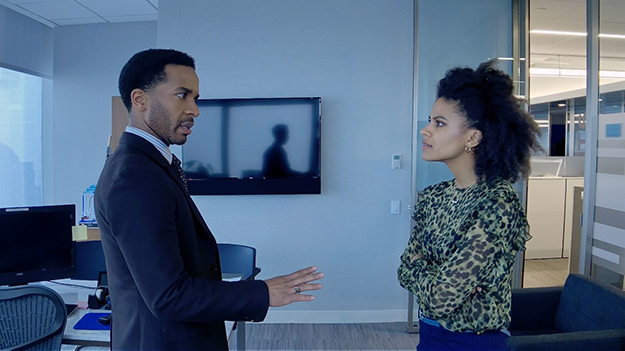
In the current conversations around race and sports, what do you want High Flying Bird to provoke or add to that conversation? What do you want people to take from it?
I’ve been asked that question and I don’t really know. I think the question that it raises is an interesting one. That’s what we started with. What if black players owned all of this? What would that look like? I’m not trying to be didactic about it and saying this is what people should be doing and should be thinking or should be feeling but we just wanted to ask the question. And what I learned through the process of asking that question is that it’s a question that’s been asked for a long time. Harry Edwards, who’s at the very end of the film and whose book is featured, has been doing this work for 50 years. In talking to him, that was one of the first things he said. “Brother, this ain’t new! Y’all might think it’s new, but this ain’t new.” You got to look back at the history of this and you’ll see. I just hope it adds to the conversation. And I hope people enjoy watching it.
So what’s next? Anything new with Tarell? What’s going on?
We’re producing. My company Harper Road, we acquired some material, some books that we’re developing.
Any you can tell me about?
There’s one I can tell you about. It’s called Black Gods of the Asphalt. So I’m producing for sure, taking some time to try to do a little self-care as well.
Face masks? What does self-care for André look like?
[Laughs] Right now it’s looking like a lot of reading. Learning a lot about masculinity, a lot about a lot of things. Learning a lot about myself and how my past, my history, has impacted or impacts my behavior today. How some of the mistakes that I’ve made in my life, why I made those decisions, how to not make those same decisions again. I guess it’s what people call “the work.” That’s what I’m trying to spend time working on. And also taking care of my family, my parents, I’m trying to spend more time with them. So I’m going to do that. And as far as acting, we’ll see. I ain’t really got nothing lined up right now, but I’ve also never been one to jump into anything. So hopefully something interesting will come along and if it does I’ll be down. And if not, I’m going to keep making my own stuff. And try to take care of my little heart.
Tayler Montague is a freelance writer, film programmer, and native New Yorker.



